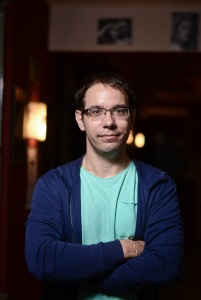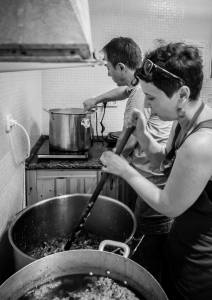The spotlight was on Hungary in the summer of 2015: unable to cope with its refugee crisis on a governmental level, it was criticised worldwide for its hostile policy towards asylum seekers. On the other hand, streets and railway stations were filled with civilian helpers, who quickly organised themselves into informal groups and networks, secretly opened restaurants and even erected tents and cottages in public spaces.
Kinga Júlia Király, writer and translator, mainly working with the prominent Kalligram publishing house, and Tamás Jászay, theatre critic and academic lecturer, editor of the revizoronline critical portal, found themselves involved in this surge of volunteerism. This double interview gives an insight into their creative work, with all its challenges and rewards. The interview was conducted in English.
A seemingly sudden arrival of refugees started late June this year. The whole process has been very controversially received by Hungarian society, media and government. How did you get informed about what was happening those days when you decided to start volunteering?
Tamás: The organised helping work of volunteers started on the 25th June in Szeged, but I can recall that months before this day I already saw foreigners with different skin colours wandering around the train station in Szeged. A cab driver told me that they were refugees and that there were already a number of cab drivers who took advantage of their desperate situation. Regarding the media coverage in the summer when the big flow of refugees started, I felt that there were two ‘trends’: the official media was talking about how hazardous it is to get in any contact with them, and there were the independent TV and radio stations which tried to show the more human aspects of the whole issue.
Kinga: In Budapest the refugee helping activism started on the 28th of June with the founding of a spontaneous gathering called Migration Aid. Frist we met personally and we started to recruit volunteers through social media. All of us were shocked by the media coverage, mainly because the mainstream and tabloid had operated with the same hatred narratives that generated flurry and turmoil in the beginning and we had not seen any proper answer or resistance to it. The example was the MigSzol (also a civilian gathering to help refugees arriving to the city of Szeged) from Szeged – actually we simply copied their actions in the beginning.
You both work in arts and culture. What made you start so eagerly and enthusiastically dedicate months of work to helping refugees?
Kinga: In my case there was a personal and professional interference. I was working on my novel (Papa Left for Sarajevo) which deals with immigration and integration issues elaborating the Eastern European models, i.e. how after democratic transformation, if there was any, the immigration problems changed. On the other hand, since the Hungarian legislation served me dozens of reasons, I consider myself immigrant, too, nevertheless I emigrated from Romania, so the change shouldn’t have been unbearable. Yet, it was.
Tamás: I arrived home on the 29th June from a big theatre festival from Poznań full of socially committed performances, very touching and
inspiring, purely political shows – one after the other. I arrived at the train station of Szeged recognising that some of my friends were there giving food and water to people. I asked them what they were doing and in an hour I returned with my partner. It was clear from the first moment that I had to help. And it went on like this for more than three months. Though I have never experienced what is it like to be an immigrant in Hungary, but as a sensitive human being it was quite easy for me just to imagine what I would do in the very same situation: what my feelings, my state of mind would be. Who would help me when I arrive at 2am to a train station somewhere in a country I never heard about and there is no one there for helping me or even to say hello? I think that was the main reason I started to help. And there were some tough moments, but I never missed this point. And, by the way, it is great to read that Migration Aid followed our patterns, but on the first days none of us had any idea of what we should or should not do. Volunteering was something new for many of us.
The communication was constantly dichotomised in terms of governmental vs. independent media coverage. But how could you keep the boat afloat as almost totally newcomers to volunteering, situations of crisis, and in dealing with such politically sensitive issues?
Kinga: Unfortunately we cannot speak about dichotomies linked only to the government and independent media. As the number of the refugees had risen for instance in the Keleti railway station, which increase wasn’t in direct ratio with the number of the volunteers, the disputes and controversy raised its head in the activist groups as well. Should we distribute food for those who do not want to enter the refugee camps or not? Monstrous! For me it was an obvious reflection of the government’s measures. Since an activist is not meant to sustain such narratives that tainted the public opinion, few of us started to establish another fb-group which wasn’t interested in one’s itinerary, we simply wanted to help and keep alive people left to their fate by the authorities. This group was the SEM (Let’s Help Together) which still helps at borders and hotspots in Serbia, Bulgaria, etc. The activists in Budapest were in a hopeless situation: we didn’t have a normal relationship with the municipality; we had to fight for every mobile toilet and depository. There were a few mavericks whose anonym financial support was indispensable in order to continue our work.
Tamás: Szeged had a special role in this whole story: if I am right that was the only city for months where the mayor decided to help the work of the volunteers with many tools, among them there were hidden means as well. The socialist mayor of Szeged, Mr. László Botka provided a wooden house for the volunteers, he sent three toilets and taps with drinking water, later with his support we started to cooperate with the shelter for homeless people just across the train station, we used their hall as a storage room. In Szeged a sort of a miracle has happened: a politician helped the volunteers without posing in front of the wooden house with crying Syrian babies in his arms, simply because he realised that we, the volunteers were protecting the city of Szeged. Just imagine when hundreds and thousands of hungry people start to approach the city centre – it’s now again about the human condition: if you are hungry and thirsty, if you want to protect your family, you will do what you need to do, that’s all.
The leaders of MigSzol Szeged published a statement about our relationship with politicians and politics: we accept every help, but not from parties or politicians who wanted to make press conferences next to us. It was a very easy and a really difficult decision at the same time: in October we refused the help of the Hungarian socialist members of the EU parliament because of this: they wanted to give us 7-8 million HUF, but with stating that it is a donation from the socialist party.
And here lies the answer for your question about the less shiny aspects of volunteering: there were some affairs and cases when a few of us left the group, because they couldn’t accept the conditions of working together. But in the first 1.5-2 months it was like a fairy tale.
How could you harmonize your work with this hectically scheduled volunteering, which sometimes lasted more than a shift a day? How did this all affect your creative work?
Tamás: Volunteering made me (and of course many of us) addicts, it was almost impossible to step back and start working on a review when I knew that there are people outside the train station in need. I would agree with you if you would say that it sounds naive and idealistic, but spending a lot of time together with the refugees helped to realise some sudden and unexpected truths about myself. So I took it as a ‘university course’, sort of propaedeutics to behave as a good man. And now, when the whole thing is over I can feel that I deal with issues like this in theatre in a much more sensitive way than I did before. I hate to say things like this, but this experience has changed my life, my way of experiencing and seeing my life and the life of others.
Kinga: I have to agree with Tamás. In the beginning I could speak about simple goodwill. To measure myself as a normal human. To test my sincerity and faith in political courage, social awareness, to be a member of a community in resistance. But after a couple of weeks I also became addicted. I suspended all my artistic projects, self-reflection came to front after each hour spent outside in the railway station or later in the cellar where I cooked for thousands of people.
Where are you at now? I mean, with volunteering, refugees, everyday work, and in terms of having a deeper insight into civilians’ work and maybe politics.
Tamás: First of all I made my way back to the ‘business’: my editors had mixed feelings about my work as a volunteer. They were really proud of me (and of course some of them were also out helping), although they were really fed up with me missing all the deadlines with days, weeks, sometimes months. Now all seem to be settled: I’m still working time to time as one of the coordinators of MigSzol Szeged, but I’m more in the backstage now, not in the frontline anymore. About what made organisations like ours so worthy is the fact that it can be revived at any point: now MigSzol Szeged shares the donations collected with Hungarian people in need, who suffer from poverty, mental illnesses, etc. and of course we try to send as many warm clothes and other useful stuff for the cold times to people in Serbia and Macedonia, but it is not easy to get money for transferring all the goods. We still have literally tons of donations, but unfortunately we don’t have money to drive them to Presevo or to Greece. I am pretty sure that MigSzol Szeged (and hopefully all the other volunteering organisations) can be reloaded and rebuilt in one or two days if it is needed. I would say let’s hope that there won’t be any need of our work, but if that would be very naive.
Kinga: This summer rearranged priorities in my professional commitments. If literature and theatre were instruments of self-expression before, nowadays I write mostly applications responding to NGO-vacancies because I’ve realised what I really want to do. It might sound sentimental, but this is the truth. I take all the possibilities to create models of sensitization for students, asylum seeker women, separated children etc. I’ve dropped my novel for a while because there is no such distance one can overcome in a short time. I also work as activist, mostly in social programmes for Hungarians in need. But my target is to become a professional in everything I did during this summer.

